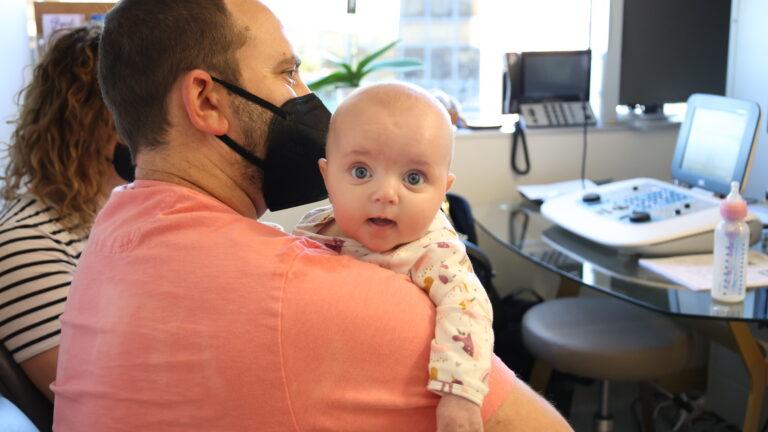

Understanding the Link Between Hearing Loss and Cognitive Decline: Key Insights and Prevention Strategies
by Zara Jethani
Explore the intricate connection between hearing loss and cognitive decline, including its impact on social isolation, cognitive load, sleep quality, and cognitive reserve. Discover effective strategies for mitigating cognitive decline, such as early interventions, social engagement, targeted exercises, and preventative measures. Learn about comprehensive diagnostic and treatment options available at the Pacific Eye, Ear, and Skull Base Center.
Hearing loss affects millions of people worldwide, particularly older adults who can suffer age-related hearing loss (ARHL). Beyond the obvious impact on communication and quality of life, recent research studies show that hearing loss leads to a higher risk of developing the diseases of cognitive decline such as dementia and Alzheimer’s.
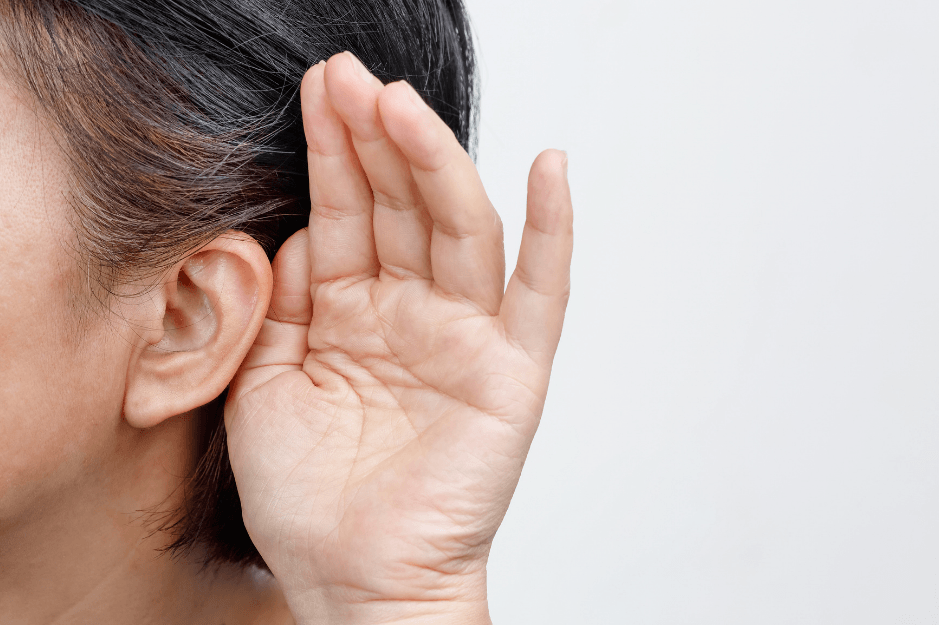
How Hearing Loss Accelerates Cognitive Decline
Causes Social Isolation
Hearing loss is highly associated with increased rates of depression and feelings of isolation, and individuals may find it challenging to engage in conversations or participate in social activities. When individuals with hearing loss withdraw from social interactions, they miss out on cognitive stimulation, potentially accelerating cognitive decline.
Elevates Cognitive Load
Cognitive decline results in the deterioration of cognitive abilities such as memory, attention and problem-solving. The Cognitive Load Theory suggests that when individuals with hearing loss struggle to comprehend speech or other auditory cues, their brains allocate additional cognitive resources to the auditory processing task. This increased cognitive load can divert resources from other cognitive functions, leading to cognitive decline over time.
Reduces Quality Sleep
Sleep patterns can be disturbed when individuals strain to hear due to untreated hearing loss. The constant exertion required to capture sounds and comprehend conversations can result in sleep disturbances. Insufficient and poor-quality sleep can have adverse effects on memory and concentration, which may contribute to cognitive decline. So, taking steps to address hearing loss and enhance sleep quality can yield positive benefits for overall cognitive functioning.
Impairs Cognitive Reserve
Cognitive reserve refers to the brain’s ability to cope with age-related changes and damage. It is influenced by factors such as education, occupation and intellectual engagement throughout the lifespan. Individuals with hearing loss may have reduced cognitive reserve, making them more vulnerable to cognitive decline. The strain placed on cognitive resources due to hearing impairment may exceed the individual’s capacity to compensate, hastening cognitive decline in the absence of proactive interventions.

How to Stave off Cognitive Decline
Fortunately, for those with hearing loss, there are early interventions that can result in improved overall health outcomes.
Stay Social with Loved Ones
Interacting with family and friends, and participating in social activities, is important for keeping your brain healthy. It helps stimulate cognitive function and maintain optimal brain function. Restoring hearing abilities can improve social engagement, thereby enhancing cognitive stimulation and reducing the risk of cognitive decline.
Elevate Cognitive & Physical Fitness
Research indicates that specific exercises can enhance brain function among individuals with hearing loss. These exercises include activities such as memorization, problem-solving, reading and playing musical instruments. Furthermore, promoting a holistic approach to brain health, including regular exercise, a healthy diet, intellectual engagement and social interaction, can play a significant role in maintaining cognitive function among individuals with hearing loss.
To optimize brain health, consider engaging with the Brain Wellness & Lifestyle Program at the Pacific Neuroscience Institute® (PNI®). Our team of experts offers specialized guidance tailored to individual needs, incorporating advanced research and holistic approaches to enhance cognitive function and overall well-being.
Prevent Hearing Loss
To help reduce the potential brain health risks linked to hearing loss, it is essential to adopt preventative measures. These include avoiding exposure to loud noises, utilizing hearing protection during activities involving high sound levels, and going for regular checkups. Additionally, hearing aids, cochlear implants or other assistive devices can significantly reduce the risks of cognitive decline associated with hearing loss by improving auditory clarity and alleviating the cognitive burden.
Hearing Loss Diagnostics Available at PNI
Hearing loss demands comprehensive understanding and professional care. It is more than a mere audiological condition; hearing loss is profoundly connected with cognition, communication, and emotional well-being. If you find yourself confronting hearing loss, do not hesitate to seek assistance at Pacific Eye, Ear, and Skull Base Center.
As seen in Santa Monica Spotlight community magazine, August 2023 edition
Pacific Eye, Ear and Skull Base Center
The Pacific Eye, Ear, and Skull Base Center consists of otolaryngologists, head & neck surgeons, and neuro-ophthalmologists. Our doctors treat a wide range of diseases and tumors affecting the eye, nose, skull base, temporal bone, ear, and throat. For individuals experiencing hearing loss, our highly esteemed ear surgeons, board-certified ENT physicians, and audiologists working collaboratively to deliver comprehensive and top-quality hearing care. We provide various treatments for different ear and hearing issues, facilitating improved and clearer hearing for patients. Our specialists evaluate and manage tinnitus and other common hearing problems, like vertigo, dizziness, and balance disorders. We specialize in employing videonystagmography (VNG), rotational chair, and balance therapy. Additionally, we offer hearing aids, including bone-anchored hearing aids (BAHA), and other assistive listening devices (ALDs).
To schedule a consultation at the PNI clinics, click here or call 310-829-8701.
Hearing Loss Specialists at Pacific Eye, Ear and Skull Base Center
Related Links
- Meet the Team – Pacific Eye, Ear and Skull Base Center
- Hearing Loss – Pacific Eye, Ear and Skull Base Center
- Neurotology – Pacific Eye, Ear and Skull Base Center
- Hearing Aid Recycling Program (HARP)
Related Articles
Related Videos
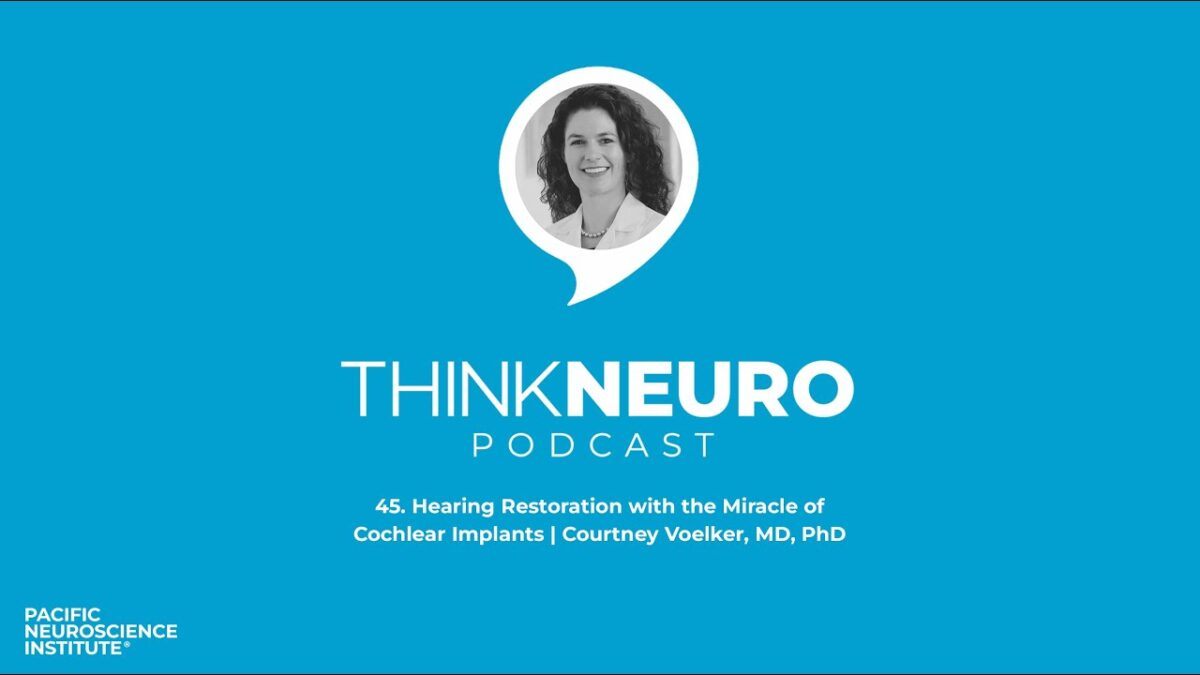 Hearing Restoration with the Miracle of Cochlear Implants | Courtney Voelker, MD, PhD
When people notice their vision blurring, they will frequently dash off to the eye doctor. Not so with hearing loss. It often goes ignored and undiagnosed until it becomes unbearable.…
Hearing Restoration with the Miracle of Cochlear Implants | Courtney Voelker, MD, PhD
When people notice their vision blurring, they will frequently dash off to the eye doctor. Not so with hearing loss. It often goes ignored and undiagnosed until it becomes unbearable.…
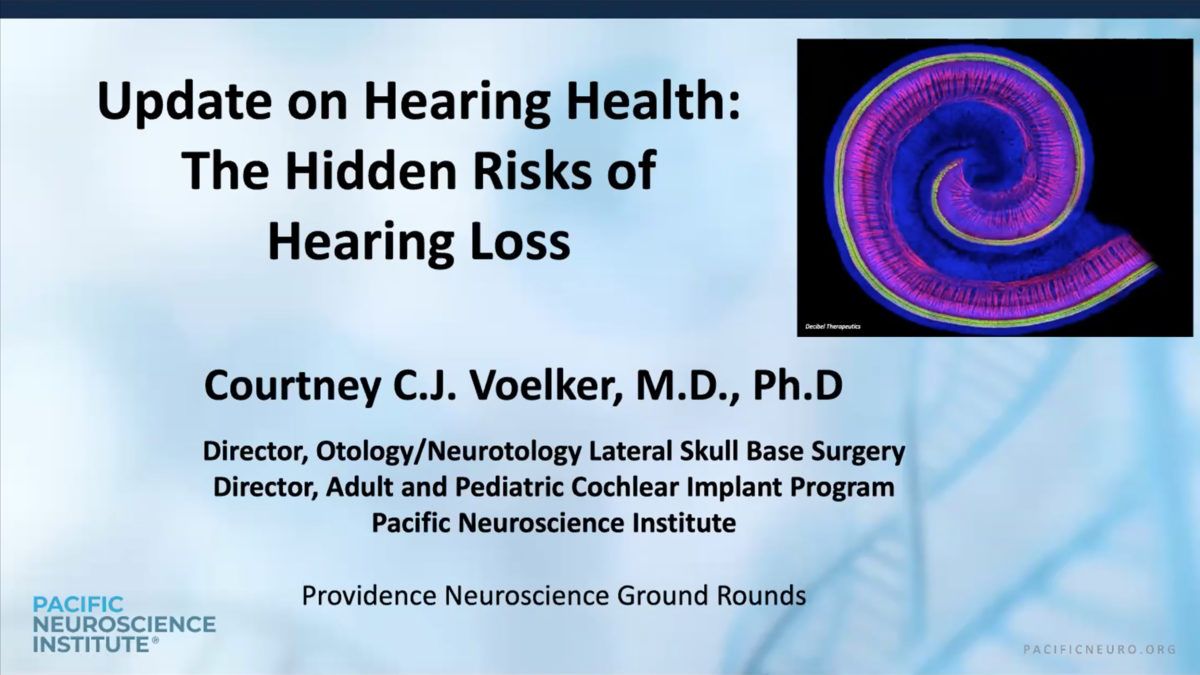 17. May, 2022: Updates on Hearing Health: The Hidden Risks of Hearing Loss
17. May, 2022: Updates on Hearing Health: The Hidden Risks of Hearing Loss
 Pediatric Cochlear Implantation for Bilaterial Hearing Loss | Sienna’s Story
Sienna was born with profound bilateral hearing loss (deafness in both ears). As her family’s hearing modality choice is listening and spoken language, they decided to pursue cochlear implant surgery…
Pediatric Cochlear Implantation for Bilaterial Hearing Loss | Sienna’s Story
Sienna was born with profound bilateral hearing loss (deafness in both ears). As her family’s hearing modality choice is listening and spoken language, they decided to pursue cochlear implant surgery…
 Rediscovering Music After Hearing Loss | Ronnie’s Inspiring Patient Story
Ronnie overcame severe ear pain and hearing loss with the help of Courtney Voelker, MD, PhD, at Pacific Head and Neck . Follow his journey through two successful surgeries to…
Rediscovering Music After Hearing Loss | Ronnie’s Inspiring Patient Story
Ronnie overcame severe ear pain and hearing loss with the help of Courtney Voelker, MD, PhD, at Pacific Head and Neck . Follow his journey through two successful surgeries to…
 A PNI Minute | What Are Cochlear Implants?
The cochlear implant is an electronic device that is implanted into the inner ear (the cochlea) to restore hearing in patients for whom hearing aids are no longer effective or…
A PNI Minute | What Are Cochlear Implants?
The cochlear implant is an electronic device that is implanted into the inner ear (the cochlea) to restore hearing in patients for whom hearing aids are no longer effective or…
 A PNI Minute | 5 Myths About Cochlear Implants
Though cochlear implants are incredibly useful in improving patients hearing, there are still many misconceptions and myths that surround them. For example, it’s a common misconception that deafness is a…
A PNI Minute | 5 Myths About Cochlear Implants
Though cochlear implants are incredibly useful in improving patients hearing, there are still many misconceptions and myths that surround them. For example, it’s a common misconception that deafness is a…
 Cochlear Implant Program at Pacific Neuroscience Institute | Dr. Courtney Voelker
Cochlear Implant Program at Pacific Neuroscience Institute | Dr. Courtney Voelker
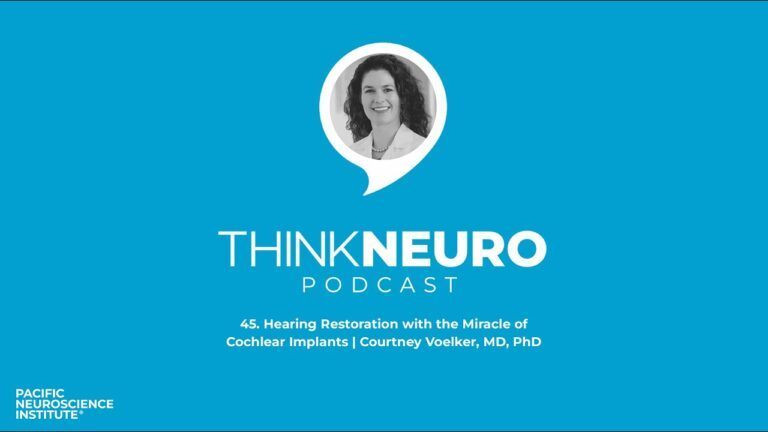
Hearing Restoration with the Miracle of Cochlear Implants | Courtney Voelker, MD, PhD
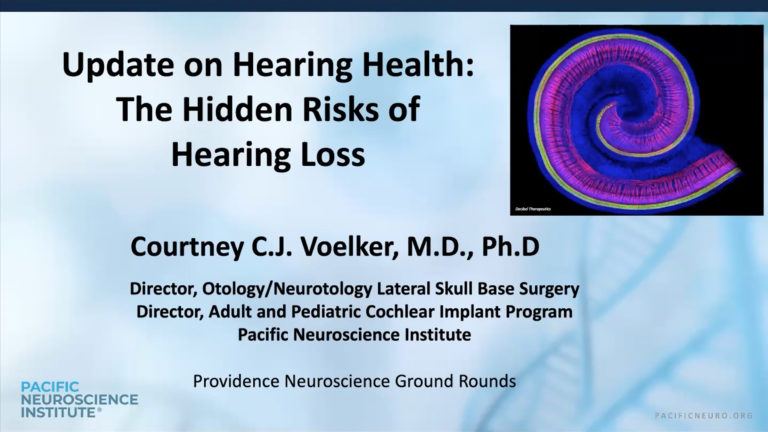
17. May, 2022: Updates on Hearing Health: The Hidden Risks of Hearing Loss

Pediatric Cochlear Implantation for Bilaterial Hearing Loss | Sienna’s Story

Rediscovering Music After Hearing Loss | Ronnie’s Inspiring Patient Story

A PNI Minute | What Are Cochlear Implants?

A PNI Minute | 5 Myths About Cochlear Implants
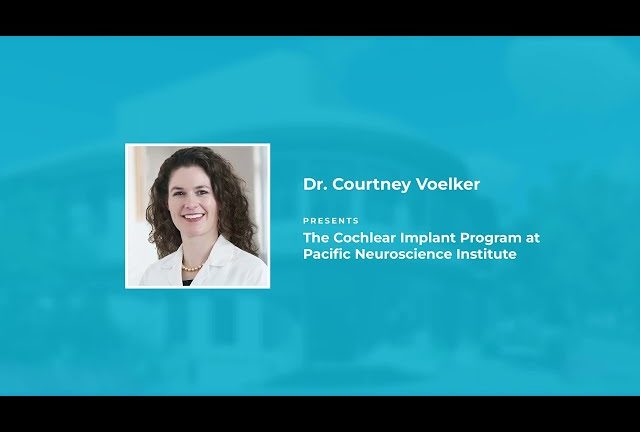
Cochlear Implant Program at Pacific Neuroscience Institute | Dr. Courtney Voelker
About the Author

Zara Jethani
Zara is the marketing director at Pacific Neuroscience Institute. Her background is in molecular genetics research and healthcare marketing. In addition, she is a graphic designer with more than 20 years experience in the healthcare, education and entertainment industries.
Last updated: January 18th, 2024






